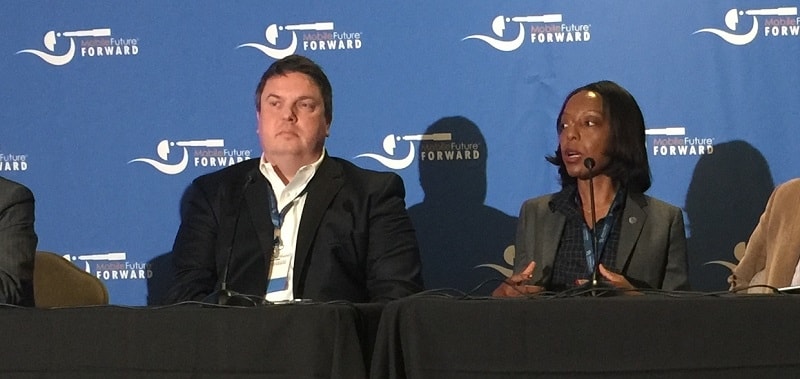SEATTLE – A top AT&T executive confirmed that the operator remains on track to launch 5G services by the end of next year, but Marachel Knight said that the operator hasn’t yet decided exactly what that service will look like.
In response to a question about whether AT&T’s initial 5G offering will provide fixed or mobile services, Knight said that “We haven’t defined that use case yet.”
Knight, SVP of AT&T’s wireless network architecture, made her comments here during a 5G panel discussion at the Mobile Future Forward show, held by Chetan Sharma Consulting.
Knight’s comments are noteworthy considering Verizon has indicated it will launch fixed wireless services using its 5G network technology standard sometime next year, after tests in 11 markets this year. However, Verizon hasn’t provided many exact details about how it plans to go to market, such as planned pricing, speeds and coverage.
Moreover, T-Mobile announced in May that it plans to launch mobile 5G starting in 2019.
Although Knight didn’t specify whether AT&T would initially launch fixed or mobile 5G services in 2018, she did provide some additional insights into the carrier’s deployment plans. She said that mobile 5G is “where the industry ultimately needs to get to.” She added that AT&T’s first 5G deployments would implement the nonstandalone (NSA) version of 5G. As Qualcomm has explained, the NSA version of 5G will use the existing LTE radio and core network as an anchor for mobility management and coverage while adding a new 5G carrier. Knight said that AT&T would then move to a standards-based 5G core, which implies full user and control plane capability for 5G, though she didn’t provide a timeline for that work.
Knight also said that AT&T would likely implement an edge computing model—a network design that essentially places network computing components geographically close to a tower or small cell—in at least a portion of its 5G network. Such a design would lower latency speeds by reducing the physical distance bits and bytes would need to travel before they could be managed and routed. Edge computing is an alternative to a traditional, centrally managed network.
“That is superimportant to get these [edge computing] investments to happen,” said Qualcomm’s Matt Grob, EVP of technology for the company.
Indeed, AT&T issued an announcement about its edge computing plans in July. The carrier said specifically that it would outfit its edge computing facilities with high-end graphics processing chips and other general purpose computers, and coordinate and manage its systems with its virtualized and software-defined network.
Knight’s comments on AT&T’s 5G plans come just a few days after the operator said it will expand its fixed wireless 5G trials to three more cities by the end of the year. Specifically, AT&T said it would operate trials in Waco, Texas; Kalamazoo, Michigan; and South Bend, Indiana, in addition to existing tests in Austin, Texas.
The carrier said the expansion will allow it to continue to test both fixed and mobile wireless offerings in millimeter-wave spectrum in the field, enabling it to accelerate standards-based deployments as soon as late next year. Participants in the expanded trials may include colleges, hospitals, churches, restaurants and other small businesses.
Although wireless industry executives have rallied around 5G as a major new opportunity to offer faster speeds with lower latency, it remains unclear exactly how the technology will be implemented. Verizon, for example, has said it may initially use fixed 5G services to offer broadband internet into users’ homes, as a way to replace wired connections. But others have blasted that approach: “The carriers are using 5G to either distract from how badly they’re losing today or to give their shareholders some hope they can compete with Big Cable,” T-Mobile’s John Legere said in announcing his carrier’s 5G plans. “Their ambitious vision for Fixed 5G to replace home internet will never provide mobile 5G coverage. It makes no sense.”
Source: http://www.fiercewireless.com/5g/at-t-reiterates-2018-5g-launch-date-but-fixed-mobile-use-case-still-undefined

